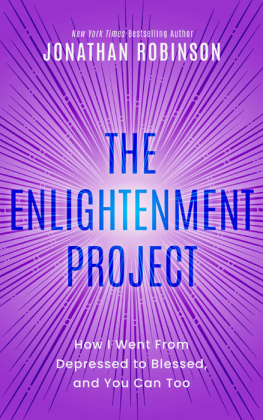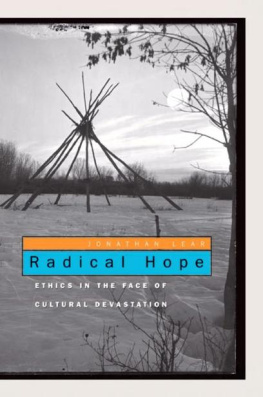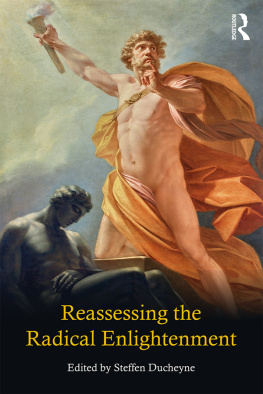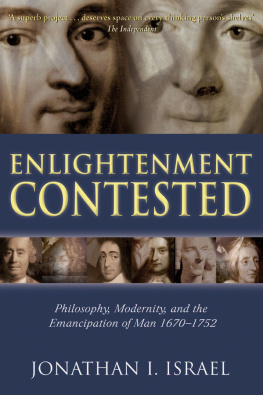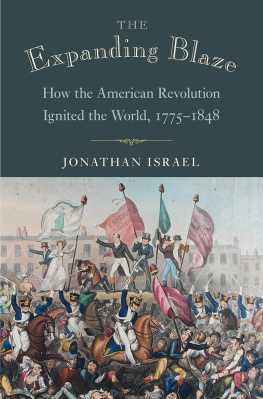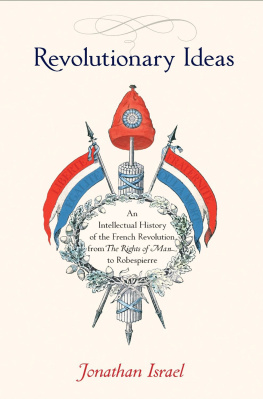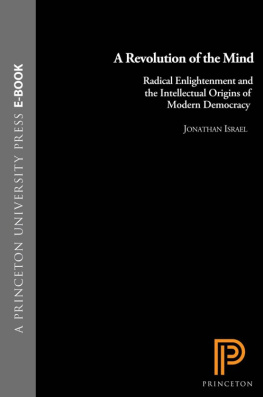Radical Enlightenment - Jonathan I. Israel
Here you can read online Radical Enlightenment - Jonathan I. Israel full text of the book (entire story) in english for free. Download pdf and epub, get meaning, cover and reviews about this ebook. genre: Politics. Description of the work, (preface) as well as reviews are available. Best literature library LitArk.com created for fans of good reading and offers a wide selection of genres:
Romance novel
Science fiction
Adventure
Detective
Science
History
Home and family
Prose
Art
Politics
Computer
Non-fiction
Religion
Business
Children
Humor
Choose a favorite category and find really read worthwhile books. Enjoy immersion in the world of imagination, feel the emotions of the characters or learn something new for yourself, make an fascinating discovery.

- Book:Jonathan I. Israel
- Author:
- Genre:
- Rating:5 / 5
- Favourites:Add to favourites
- Your mark:
- 100
- 1
- 2
- 3
- 4
- 5
Jonathan I. Israel: summary, description and annotation
We offer to read an annotation, description, summary or preface (depends on what the author of the book "Jonathan I. Israel" wrote himself). If you haven't found the necessary information about the book — write in the comments, we will try to find it.
Jonathan I. Israel — read online for free the complete book (whole text) full work
Below is the text of the book, divided by pages. System saving the place of the last page read, allows you to conveniently read the book "Jonathan I. Israel" online for free, without having to search again every time where you left off. Put a bookmark, and you can go to the page where you finished reading at any time.
Font size:
Interval:
Bookmark:
RADICAL ENLIGHTENMENT
Philosophy and the Making of Modernity 16501750
JONATHAN I. ISRAEL


Great Clarendon Street, Oxford OX2 6DP
Oxford University Press is a department of the University of Oxford.
It furthers the Universitys objective of excellence in research, scholarship,
and education by publishing worldwide in
Oxford New York
Athens Auckland Bangkok Bogot Buenos Aires Calcutta
Cape Town Chennai Dar es Salaam Delhi Florence Hong Kong Istanbul
Karachi Kuala Lumpur Madrid Melbourne Mexico City Mumbai
Nairobi Paris So Paulo Shanghai Singapore Taipei Tokyo Toronto Warsaw
and associated companies in Berlin Ibadan
Oxford is a registered trade mark of Oxford University Press
in the UK and certain other countries
Published in the United States
by Oxford University Press Inc., New York
Jonathan I. Israel 2001
The moral rights of the author have been asserted
Database right Oxford University Press (maker)
First published 2001
All rights reserved. No part of this publication may be reproduced,
stored in a retrieval system, or transmitted, in any form or by any means,
without the prior permission in writing of Oxford University Press,
or as expressly permitted by law, or under terms agreed with the appropriate
reprographics rights organizations. Enquiries concerning reproduction
outside the scope of the above should be sent to the Rights Department,
Oxford University Press, at the address above
You must not circulate this book in any other binding or cover
and you must impose the same condition on any acquirer
British Library Cataloguing in Publication Data
Data available
Library of Congress Cataloging in Publication Data
Israel, Jonathan Irvine.
Radical enlightenment: philosophy and the making of modernity, 16501750/Jonathan
I. Israel.
p. cm.
Includes bibliographical references and index.
1. EnlightenmentEurope. 2. EuropeCivilization17th century. 3. EuropeCivilization18th century. 4. Spinoza, Benedictus de, 16321677. I. Title.
B802 I.87 2001 940.25dc21 00044086
ISBN 0-19-820608-9
1 3 5 7 9 10 8 6 4 2
Typeset by Best-set Typesetter Ltd., Hong Kong
Printed in Great Britain
on acid-free paper by
T. J. International
Padstow, Cornwall
There are various ways of interpreting the European Enlightenment, some long cultivated in the historiography, others of more recent provenance. One formidable tradition of study adopts a primarily French perspective, seeing the wider European phenomenon as a projection of French ideas and intellectual concerns, especially those of Montesquieu, Voltaire, Diderot, DAlembert, dHolbach, and Rousseau. Another approach, which enjoys support not only among Anglophone but also some continental scholars, envisages the Enlightenment as an intellectual reorientation inspired chiefly by English ideas and science, especially the endeavours of Locke and Newton. In recent years, it has also become fashionable to claim there was not one Enlightenment but rather an entire constellation or family of Enlightenments, related but distinct, growing up in numerous different national contexts. Finally, there has also been an incipient tendency latterly to distinguish between a mainstream moderate and a more radical underground Enlightenment, albeit usually with the latter being deemed essentially marginal to the wider phenomenon.
One of my two main purposes in this work is to argue for another and different way of approaching the subject. The French perspective, though it has much to offer, remains increasingly susceptible to the charge that it underestimates the extensive philosophical and scientific borrowing all major eighteenth-century French thinkers engaged in. The English approach might seem initially more plausible, not least since Voltaires original stance was based almost wholly on Locke and Newton. Yet given the slow and sporadic reception of Locke and Newton outside Britain, and still more the often penetrating criticism their ideas were subjected to, this perspective is, in reality, even more vulnerable not just to the charge that it overly inflates the role of a particular nation but also that it fails to grasp the wider play of forces involved. As for the idea that we are dealing with a whole family of Enlightenments, there are seemingly insuperable objections to this too. For this notion encourages the tendency to study the subject within the context of national history which is decidedly the wrong framework for so international and pan-European a phenomenon. Worse still, it unacceptably ignores or overlooks the extent to which common impulses and concerns shaped the Enlightenment as a whole.
My first goal then is to try to convey, however imperfectly and tentatively, a sense of the European Enlightenment as a single highly integrated intellectual and cultural movement, displaying differences in timing, no doubt, but for the most part preoccupied not only with the same intellectual problems but often even the very same books and insights everywhere from Portugal to Russia and from Ireland to Sicily. Arguably, indeed, no major cultural transformation in Europe, since the fall of the Roman Empire, displayed anything comparable to the impressive cohesion of European intellectual culture in the late seventeenth and early eighteenth century. For it was then that western and central Europe first became, in the sphere of ideas, broadly a single arena integrated by mostly newly invented channels of communication, ranging from newspapers, magazines, and the salon to the coffee-shop and a whole array of fresh cultural devices of which the erudite journals (invented in the 1660s) and the universal library were particularly crucial.
My second objective is to demonstrate that the Radical Enlightenment, far from being a peripheral development, is an integral and vital part of the wider picture and was seemingly even more internationally cohesive than the mainstream Enlightenment. Frequently, the moderate mainstream were consciously, even desperately, reacting to what was widely perceived as the massively dangerous threat posed by radical thought. Many scholars will, I assume, be rather surprised by the prominence given here to the role of Spinoza and Spinozism not only on the continent but even in the British context where, historiographically, there has been a persistent refusal to acknowledge that Spinoza had any influence at all. Yet a close reading of the primary materials strongly suggests, at least to me, that Spinoza and Spinozism were in fact the intellectual backbone of the European Radical Enlightenment everywhere, not only in the Netherlands, Germany, France, Italy, and Scandinavia but also Britain and Ireland.
Of course, neither the Enlightenment itself, and still less its consequences, were limited to Europe. There is indeed a further dimension to the problem of how to interpret the Enlightenment. For if the Enlightenment marks the most dramatic step towards secularization and rationalization in Europes history, it does so no less in the wider history not just of western civilization but, arguably, of the entire world. From this, it plainly follows, it was one of the most important shifts in the history of man. Fittingly, there exists a vast and formidable literature on the topic. Yet there are comparatively few general surveys and large-scale interpretative works, and it is possible to question whether it really receives the emphasis it deserves in the study and teaching of modern history, in comparison, for example, with the Renaissance and the Reformation. These too, of course, were vast and fundamental changes, at any rate in western civilization. Nevertheless, these earlier great cultural movements, limited as they were to western and central Europe, are really only adjustments, modifications to what was essentially still a theologically conceived and ordered regional society, based on hierarchy and ecclesiastical authority, not universality and equality.
Next pageFont size:
Interval:
Bookmark:
Similar books «Jonathan I. Israel»
Look at similar books to Jonathan I. Israel. We have selected literature similar in name and meaning in the hope of providing readers with more options to find new, interesting, not yet read works.
Discussion, reviews of the book Jonathan I. Israel and just readers' own opinions. Leave your comments, write what you think about the work, its meaning or the main characters. Specify what exactly you liked and what you didn't like, and why you think so.

